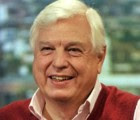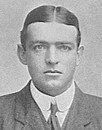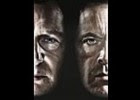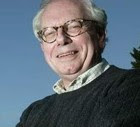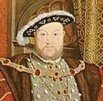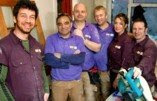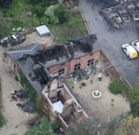Once upon a time, many years ago, this blogger co-wrote a book about
The Avengers which, for a variety of different reasons, never came out quite as myself and my co-authors, Paul Cornell and Martin Day, intended. The first edition of the book contained (somewhere near the back) an essay of mine - a piece of work that I was particularly proud of at the time but which, again for a variety of reasons, didn't appear in the subsequent second edition, published four years later. With the book now long since out-of-print, this is an extended and reworked version of that very piece.
It is often said that if you can actually remember the 1960s then you
weren't really there. Certainly, the popular perception of the era – nailed into the essential public consciousness via numerous contemporary and retrospective movies and television shows - is of one decade-long groovy
melange of free-sex, political literacy, anti-establishmentism and a surfeit of mind-bending and illicit drugs; that, as Philip Larkin memorably wrote, 'sex began in 1963' (and ended at some point around about the time of the October 1973 OPEC oil crisis) and that everything in-between was the longest, most stylished, sophisticated and pleasantly drunken house-party in history. Or, certainly, since the Roman Empire concluded. Where all gatecrashers were banned and only the very best records were played.

All of which may well have had a certain element of truth about it for the occupants of the smart apartments and town houses in Chelsea and Knightsbridge but had very little to do with the average working-class family in the rest of the UK living on a council estate on a weekly wage of twenty quid. It is important for any creative historian to remember that most works of fiction are,
of course, governed by the socio-political and cultural atmospheres in which they were created. But certain works from that particular era have been elevated to such a mythical status that these sorts of considerations seem, on the surface, to have little actual substance to them. That
The Avengers was a television series shaped as much by the complexities of 1960s British society and its (equally complex) collective attitudes towards issues as diverse as class, conventional morality, the UK's shaky place in the world and sexual consciousness as much as by, let us say, the Cuban Missile Crisis or the 1966 Dock Strike doesn't change the basic fact that
The Avengers was a product of its era in just the same way that
Coronation Street,
Z Cars,
Steptoe & Son and
Doctor Who all were. The aesthetics may be vastly different in each case, but the cultural and conceptual conceits which helped to shape all of these - fine – series were pretty much identical.
Possibly because of the – many - social and political barriers which were overturned during this period (or in some cases, strictly speaking, during the period immediately afterwards) and to the changes in many peoples' lives which were affected by these crashing barriers, especially among the young and more affluent, the method via which such changes were relayed to the masses have acquired the reputation of being in some way, not only the medium through which these changes were seen but, more specifically, to have been actually
responsible for them.

Which is as false a claim as any that has ever made about the 1960s. It
is nevertheless certainly true to say that television
reflected - sharply, sometimes accurately and, occasionally, with more than a hint of trend-setting - what was going on. That is, kind of, the nature of the beast. In Great Britain, anarchic – and disparate - movements such as the satirists, the modernists and situationalism, the rapid growth of feminism and of the radical left (and the new right, for that matter) and, the birth of the cult of celebrity found a
niche for themselves by using the populist medium of television to their own advantage. But television's influence was – and, largely, still is - a double-edged sword in this regard, creating a fictionalised era based, in many people's minds, upon its drama. This is probably true of the literature and visual texts of other eras, of course, but seldom has it been more acute and, in some ways, more counter-productive than it was during this period.
Which brings us to
The Avengers …
For many people,
The Avengers IS the 1960s personified - a gloriously over-the-top, camp and technicolour excess of 'Swinging' styles and 'with-it' attitudes. Occupying an only-marginal fictional London, its tree-lined mews and avenues paved with stolen microfilm and mad scientists; the kitsch, modernist apartments with their ultra-functional appliances battling for prominence amid art-deco flourishes and tasteful mood trappings; the
élan car chases, in elegant but powerful machines, through the deserted, hedgerow-lined country lanes of green-belt Hertfordshire; the eccentrics whose names reflect their obsessions and the comic-strip wit of everyone concerned are all classic elements often cited by fans and critics alike as reasons for
The Avengers' longevity.
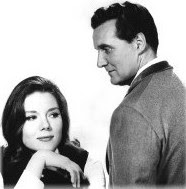
It's, again, that curious suggestion that the 1960s was essentially one long party to which
everyone was - potentially - invited, but that, in reality, only those with the correct accent (be it Old Etonian/Rodean-class or Scouse/Shepherd’s Bush pop star-chic) and the manners to match could attend. You were either born with it, acquired it or had it thrust upon you and, if you
didn't then, sorry, but you were, like,
nowhere baby. In terms of the myth that surrounds it,
The Avengers could almost be said to have become a genuine icon of its age. Something that transcends its humble, downbeat origins and to have become a definitive 'statement' on both the era and its many excesses. It is somewhat ironic that the very mention of
The Avengers summons up a fixed image in most viewers minds when, in fact, the series itself was, from the very start, one of television's great chameleons. Changing - almost weekly - not only with the times but, in some cases, well ahead of them.
The Avengers' mirroring of Sixties concerns has been well documented elsewhere. But, although the series sometimes gave the impression of trying to fit a square peg into a groovy hole (notably in its blinkered, and surprisingly jealous, ignorance of youth culture on several notable occasions),
The Avengers tended only towards true conservatism when certain televisual norms required it to.
Seen, in 1961, as a breath of fresh air to the stagnating genre of crime drama,
The Avengers started off reflecting a world-view still dominated by the 1950s and all of that previous decade's suffocating one-nation austerity Conservatism, post-war gloom - notably about Britian's diminishing role in the world - and obvious internal neuroses. A world of black and white, literally as well as metaphorically. In 1961, when Sydney Newman created the show, the Cold War still raged (and it would get an awful lot colder within the following year); public perceptions of spies and spying was that of Burgess and MacLean (we didn't even know about Philby at that stage, much less Blunt). Moles
within The Ministry - little men in bowler hats and umbrellas whose allegiance was to one side or the other. There was no middle ground in those days, no
Guardian hippy-liberal sitting on the fence.

Just as this was perceived to be a world of, essential, decency without crime, or foreigners, or dog-shit. You were either
with us or
again’ us. The Soviet Union was, to all but the most vocal of neo-Stalinists, a terrifying nuclear bogey-state, a bear of a nation run by apparent madmen hell-bent on international Communist dominance or, if they couldn't have that, then mutually assured destruction as a valid lifestyle choice for the entire bloody world. And, the Chinese were just as bad. Those spies who worked for those organs were either foreign agents, ideologues brought up within the sinister machinations of the party machine, or British double-agents, turned by misguided ideology or greed or else blackmailed whilst still at university because they were queer. In this climate of increasing paranoia and dread the James Bond novels of Ian Fleming were flourishing and there was even talk of movie adaptations on the horizon, Alfred Hitchcock's sophisticated spy thrillers like
North By Northwest were hugely popular and television, sensing (as television often does) an attractive trend that could be followed, created its own branch of this mini-genre.
Originally devised as something which could accommodate a multitude of different styles and inhabit exotic locations (just so long as they could be created on a Borehamwood backlot, obviously),
The Avengers began in 1961 as something of a generic patchwork. There were elements of the standard 'amateur sleuth' adventure, popular with crime novelists for decades, in the character of David Keel, the series nominal hero figure.
The mysterious quality of his partner/handler John Steed's character, though, came straight from Fleming's twilight
demi-monde world of gentleman's clubs and sophisticated double-dealing. The London that Steed and Keel inhabited was a very strange mixture of cod working-class criminality (see
The Frighteners or
Hot Snow, for instance) and the twilight shadows of espionage (highlighted in excellent second season episodes like
Propellant 23,
Man In The Mirror,
Death On The Rocks' and
Mission To Montreal).
Even from the modern perspective,
outré and extreme examples of these early episodes, it's a huge step to what we had at the end of the decade, a juxtaposition of the postmodern, surreal and bizarre trappings within a fantasy
oeuvre. Yet it was a step (or, actually, a series of steps) achieved within a definitive framework. Just like
all television. As has been noted previously, television is - ultimately - the business of compromise and it is usually necessary for the medium to forsake at least some of its artistic leanings in search of true populism. That
The Avengers was both critically and commercially successful during the 1960s is a useful indication that such contradictions can also be perfectly compatible.
The reason that
The Avengers continues to be regarded as some kind of definitive statement on the era that spawned it is difficult to pinpoint, although it is (thankfully) true that the mid-decade episodes –
The Emma Peel Years, essentially - have (for the most part) aged very well. This, in itself, is not particularly important - the kitschness inherent in many episodes is often cited, blandiloquently, as the sole reason for the affection with which the series continues to be held. Yet kitsch, as we know, normally works only in small doses. This does, therefore, begin to highlight how important
The Avengers is in televisual terms.
The early juxtaposition between
faux-naïf dabblings of quasi-realism and the exotic forms of revolt in style and content for which the series would become most celebrated manifested themselves, largely, during the third season with the proper establishment of the Patrick Mcnee/Honor Blackman partnership. The early steps towards kinkiness and strangeness became more pronounced (Cathy Gale's character being at the forefront of advances in both), more focused, more aggressive. See
Mandrake,
Man With Two Shadows,
Build A Better Mousetrap,
Esprit De Corps et al. By the end of the third season
The Avengers had, effectively, begun to develop its own little - insular - world:
Avengersland. A world where 'the enemy' could no longer be recognised by the accent of a particular political or state system, or even by the old school tie but, rather, by the protagonists' greed, their obsessions and their lust for power, or anarchy, or both. At the same time as real-world politics was becoming more a matter of presentation than dogma, so
The Avengers worked itself into the new structures of power by being disdainfully aloof to anything so casual and two-dimensionally flat as
reality.
There was simply no time for any kind of radical world-view in the early seasons. Steed and Keel were members of The Establishment (the doctor possibly less so, but, for all of the righteous anger at manifest injustice which characterised his motivation to live the life he did, he was still a management stooge through his relationship with Steed). Ditto, Cathy for most of the time. The series took time out to be cynical about politics and politicians (notably in the shockingly
au currente November Five - a story about political assassination shown just three weeks before John Kennedy's murder). But, by the time that Emma arrived, a decision had been taken to actively avoid getting into overt political questions. Steed has a degree of independent thought from within the system (
The Master Minds is a fine example,
The Wringer another) and spent time pondering class consciousness (
Two's A Crowd), but, hell, if
Steed wasn't a Tory then
who was? Interestingly, for the entire period from the middle of season three until
The Avengers ended, there was a Labour government in power. Is it possible that the series itself was an MI5 attempt to undermine socialism from within and replace it, via a
coup d'etat, with someone like Lord Mountbatten running the show? Nah,
that's worthy of a Philip Levene script.
True politics, of course, is about far more than shallow Westminster partyism. Cathy's horror at her given role in a man's world was manifested in the number she threw over her shoulder with somewhat gay abandon. Wonderful stuff, but not very constructive in a way forward for The Sisterhood, Mrs Gale. Emma Peel, on the other hand, displays a complete lack of any form of traditional female concerns. Both women hated being patronised and weren't above using strong-arm tactics to get their way (a line of dialogue in
Don't Look Behind You, later reused in
The Joker, indicates both Cathy and Emma's hatred of male smugness: 'How'd you like me to break your-arm?')
The Avengers certainly kicked a few doors open in the face of bigots and that was - and remains -
a very good thing. The fact that the series is still widely seen as having a significant role in the changing of popular perceptions of women's ability is, without doubt, one of its proudest achievements (even if it doesn't stand up to all that much hard scrutiny).
Conversely, when this blogger was co-writing
The Avengers Dossier in the early 1990s, it should have been easy to dispel, once and for all, the myth that
The Avengers was, in any way, casually racist. It's a horrible charge to throw at anyone and it's not something that anyone likes to believe about one of their favourite shows. So, myself and my fellow authors really wanted to nail that claim once and for all. Sadly, it didn't proved anywhere near as straightforward as we had hoped. A quick pop quiz will illustrate our problem: Name five
Avengers pre-1965 episodes featuring a black actor. Easy:
The Frighteners,
Kill The King,
Immortal Clay,
The Gilded Cage,
The Medicine Men. And that’s
without really thinking about it very hard. Now, second part, name five episode
after 1965. Not so easy. Brian Clemens' much quoted dictate on the lack of presence of black actors in the series and of the class conditions that he felt necessary to the creation of such a rule, have been discussed at length elsewhere and both criticised and defended in equal measure. (My friend Paul Cornell's memorable assertion that 'sadly, the only black man you'd ever see in most of
The Avengers was Honor' being a particular favourite of mine.) However, it has to be said that the fact that such a rule - however justifiable the producers could argue it to be on the grounds of distancing the series
aesthetic from realism - could not and would not be tolerated today is the clearest indication that, in this regard at least, television (and life) has changed for the better since the 1960s. All wretched political correctness aside, that sort of thing has the potential, always, be viewed as little short of justifying crass and unhelpful niggerism. To be blunt, if one ignores entire ethnic groups for the sake of presenting a fiction whose audience will (presumably) include members of said groups then it is, at best, a trivialising of important social issues and, at worst, a bloody
obscenity and one that even
The Avengers' greatest fans - and this blogger is one of them - cannot have
any pride in. 'We only admit to one class and that is upper,' said the series writers' guide. Fine. The fact that
The Avengers production team could not, it appears, conceive of too many situations where a person of colour could occupy a place
in those upper echelons of such a society says an awful lot about 1960s Britain as well as 1960s television.
Society was developing and evolving not just because of the force of the changed perceptions of individual men and women. Hand-in-hand went an evolving technology and technological consumerism. The third and fourth seasons of
The Avengers showed a paranoid edge when it came to the technical advance of knowledge, a rather Luddite attitude that wasn't uncommon in much 1960s television, even among ostensibly fantasy-based programmes. It was, however, unusual to have a series which seemed so keenly in-tune with the vibes on the streets coming on like a reactionary old git when it came to this week's latest 'new toy'. Criticising electronic brainwashing techniques like those used in
The Wringer may have been hip to the groove, but when you start attacking robotics and cybernetics (
The Cybernauts), computers (
The House That Jack Built) and cool invasions by man-eating-plants-from-outer-space (
Man-Eater Of Surrey Green), then the kids are entitled to ask just how 'turned-on' and 'tuned-in' you really are in the great scheme of the
whatsit and the
how'syerfatha. Any cultural analysis of the 1960s usually has to conclude that whilst the era produced splendid scientific wonders, the public were, almost to a man/woman, so frightened of out-of-control technology that such advances were regarded as little more than another step towards Armageddon.
But, here's a problem. The Armageddon that the series railed against was rarely reflected in its landscapes, either emotional, institutional or architectural. The bent-out-of-shape wide-focus rocket-concrete of most mid-Sixties feature films may be missing from
The Avengers (whose London was vaguely rural, with tree-lined Mews and no urban decay), but there is still an element of groovy-angst in
The Avengers (especially in the astonishing fourth season) that lies perfectly in tune with the
beat of the era.

The lyrics of The Rolling Stones circa 1965 (notably in hysterically paranoid songs like 'Get Off My Cloud' and '19th Nervous Breakdown') frankly sound like lines of dialogue from
Avengers episodes of the period. This was
life in the fast lane, even if that particular fast lane was a twisting country bridal path travelling from Smalltown, Hertfordshire to Nowheresville, Bucks that played havoc with your Aston Martin DB5's suspension. The concerns of 1960s living, as well as somewhat extreme examples of 1960s neuroses, are visible in contemporary many episodes: the consumer society in the superb
Death At Bargain Prices, dating agencies in
The Murder Market, the permissiveness of the idle rich in
A Touch of Brimstone, dropping out (in all its forms) in
A Sense Of History (and, later,
Escape In Time), indoctrination (
Something Nasty In The Nursery), the anxiety of nightmares in the BF Skinner-influenced
Death's Door and, generally, the sheer pace at which life was going (brilliantly satirised in
Dead Man's Treasure). For all its mood trappings
The Avengers showed a sense of mistrust with many aspects of modernity.
The fifth season is, perhaps, the point where it all comes together. True, for many in the
cognoscenti the black and white Diana Rigg episodes of 1965-66 are the pinnacle of
The Avengers creativity and skill (
Castle D’eath,
Dial A Deadly Number,
Too Many Christmas Trees,
The Girl From AUNTIE, the extraordinary, headline-making
A Touch Of Brimstone et al) but, for this author, it was what came next that
really counted.
The Avengers In Color [sic]: A caption slide appears of a carnation stuck in a revolver (how
very 1960s!) Then, the title sequence - that marvellous choppy Laurie Johnson jazz tune with its left-field trumpet solo and thundering brass and string score, as Steed and Emma walk towards each other in a chic-but-minimalist setting (it could be the drawing room of a posh country house, an ultra-all-mod-conned King's Road apartment or a TV studio).
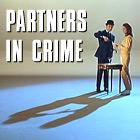
Austere yet stylish and rather charming.
Classy. The title comes up, and the tune becomes jauntier. We see swordsticks, silhouetted karate moves and
very red carnations. A stylistic summary of the series in swiftly intercut images. Then, a teaser sequence, usually showing how the body of the murder victim that our heroes are going to investigate came to be where it is. The title and a little description:
Steed Does This, Emma Does That. After that - unknown to viewers of most syndicated repeats of the 1980s and 90s - there was always an incredibly pithy little scene in which Steed would tell Emma: 'Mrs Peel, we're needed' in a variety of unusual ways. From that surprised first caption onwards, the show luxuriated in its new found colourfulness and breathed confidence, assurance, methodology. Satisfying a
smart criteria, specific, measurable, achievable, realistic, timebound. A perfect world in miniature in which chaos is order and order is chaos. Eternal. Stone.
Immaculate.
Colour had first come to
The Avengers camp in the form of an extended trailer,
The Strange Case Of The Missing Corpse. This was filmed on the set of the final season four episode,
Honey For The Prince and was broadcast in America as a prelude to the new series. After the transmission of most of the black-and-white Rigg episodes, it had become clear that this curious British series was becoming increasingly (outrageously) popular on primetime network TV in States. Why? Well, Diana-in-leather helped but there were other factors. Because 1966 was the year when Davy Jones was the most popular of The Monkees, when The Stones were bitching about just how very unsatisfied they were with pretty much everything and The Beatles had seen it, done it, smoked it and were about to start growing moustaches just to prove it.

In short, 1967 was going to be a
good year to be British, a good year to be young and a good year to be a new word dripping outwards from the West Coast of America,
psychedelic. Whether
The Avengers actually
was is pretty much a moot point but, since the previous year's big surprise US TV hit had been
Batman, it might be a good idea to adopt a tongue-into-cheek approach to life in general and crime solving in particular with a dollop of comic-strip wit. Check. Check. Check(ish) and, very definitely, check. The 'unspoken-best-friends' relationship between Emma and Steed was, by now, well-established and, indeed, was seldom even referred to within the text. It didn't need to be. They no longer seemed to have any obvious history, such was the confidence of that particular batch of episodes. In America, for instance, there was no longer any need for that - quite embarrassing - explanatory voice-over from the previous year, booming out concerning our heroes' mission in life, one that they never saw fit to explain in Britain because it, quite simply, wasn't needed. They were Steed and Mrs Peel, you dig? They did 'stuff.' It was
cool. In this season, Steed simply showed up on Emma's doorstep (although, there were occasion hints that, post-coitally, he'd been there
all night) and they were off, without backgrounds, motives or organisations to hinder them and only an unspoken agreement holding them together. What a
brilliant piece of sleight-of-hand that something so utterly simple could conquer America.
It must be noted, in the interests of balance, that with colour came a slight decline in the subtlety and sublimeness of the caustic wit which one had come to expect of the series. Some of the 1967 episodes have, dare one say it, their odd dull or formulaic moments. However, there was humour aplenty to be had from the actual situations with
A Funny Thing Happened On The Way To The Station,
The Hidden Tiger and
Who's Who??? being riotous in, and of, themselves with the dry and caustic scripted jokes, therein, being an added bonus.

As regards the Kinkiness Factor, Emma had pretty much stopped being tied to things on such a regular basis, but Steed's eyebrow-work had heightened an inch or two with some of the knowing exchanges between them. Champagne was still not the all-encompassing cultural weapon that it was later to become. The icon appears in only five of the 1967 episodes – though we hear that the body-swapping Basil and Lola have finished some off in a sixth. However, it was now all over the title sequence. The fights, however, become outrageous and vast production numbers. It was obvious from
The Winged Avenger that the production team had taken note of the development of this art form in
Batman and acted accordingly.
The great Philip Levene wrote exactly half of the season's scripts (eight), including the first four episodes to be transmitted and he did a remarkably fine job. Three, in particular,
Escape In Time,
From Venus With ♥ and
The Hidden Tiger have many champions for being the best
Avengers episodes of all. It is Levene's
Avengersland that most people remember fondly, with one foot set firmly in the real world and the other,
very definitely not. Verbal wit was an important part of what Levene did, but so to was the complete interrogation of a entire concept into the story.

For example, in
The Hidden Tiger, we get every single take on the concept of killer cats, every possible 'pussy joke' imaginable, every pun and wink to the audience with the writer's usual
bijoux comic timing to the point where you simply want to watch the episode with someone curled up in your lap purring and wanting her stomach tickled. Brian Clemens, on the other hand, was a much more direct author, who tended to present the central problem, the 'twenty-words-or-less' of American screenwriting, straight away in the opening scene and then, simply, do variations upon it. Clemens contributed six scripts to the fifth season which ranged from the quite wonderful –
The Bird Who Knew Too Much and
The Superlative Seven - through to the patchwork
The Living Dead (a cut-and-paste job from an Anthony Marriott story that bears the signs of swift rewriting and borrowed from the previous years season opener
The Town Of No Return) to the horrid
Epic. Just what makes
Epic so
apocalyptically awful is worth considering for a moment. It seems, from surface evidence, to be a deliberate attempt to create a genuinely 'iconic'
Avengers episode, one that Clemens could provide as an example to new writers - that he could point to and say '
that's how it should be done.' Everything that one expects in an episode from this period is present and correct. Perhaps as a direct result of this banal
obviousness it come across as completely vacuous and soulless, without any heart or much individuality. This was to be the main problem in later years,
The Avengers trying just that little bit too hard to be itself and, like some neurotic impersonator, losing all confidence in the process. Of the other writers, Richard Harris contributed the very nice
The Winged Avenger (he would continue to be a welcome occasional contributor to the show for the next couple of years, his
Game being easily the highlight of the disappointing final season).

One of the best scripts of 1967 was actually a rewrite:
A Funny Thing Happened On The Way To The Station started off as a Roger Marshall script, but Marshall and Clemens are reported to have clashed over the direction that the series was taking. (Marshall objecting, perhaps far-sightedly, to some of Clemens' excesses.) The pseudonym Bryan Sherriff was therefore used for the completed episode. Whether the quality of the end product is the result of a typically witty Marshall script or of Clemens' forceful moulding of the series into its own image is hard to decide. One actually prefers to think of it as a typical example of
Avengers-serendipity, a happy accident of the kind that would soon prove to be difficult to reproduce deliberately.
Following a six-week break after the completion of
Who's Who??? in April 1967, the production team returned to Borehamwood to complete a further ten episodes. Along with the sixteen from the fifth season, these were intended to be sold as a twenty six-episode package to the American networks. In the end, it didn't turn out that way. The schedule was tight as the first episode of the new batch -
Return Of The Cybernauts - was due to go out as part of the ITV autumn package in September 1967, at which point the team would still be filming the later episodes - and if anything went wrong, the consequences could be disastrous. When something
did go wrong, it came in the formidable shape of Diana Rigg.
The popular perception of the mid-Sixties, of course, is of an
Avengers episode being completed and then Patrick and Diana having a quick glass of champagne in their trailer before popping into town in the Bentley, still in-costume, to enjoy an evening at The Ad-Lib
discothèque with Michael Caine, Terence Stamp, Sean Connery, The Beatles and The Who. In fact, according to Rigg, 'It was great fun to do but everyone thinks it was party, party, party. In fact it was
work, work, work. You had to get to the studio at Elstree for 6.30 every morning and you'd be working until eight o'clock every night.' She also claimed that she was earning 'less than the cameraman' and eventually issued an ultimatum to ABC, describing her working conditions as 'the life of a mole.' In the event, she got her – well-deserved - pay rise but she indicated that this would be her final batch of episodes. Having already earned more than five million dollars from US syndication rights (proudly trumpeted in an article in
The Times in March 1967), the production team could, perhaps, afford to be generous towards one of its two biggest assets.
Aesthetically, the stories from the fifth and sixth seasons are very similar, although the 'Mrs Peel, we're needed' sequences disappeared. However,
something seems to have changed in the writers' bible during the summer of 1967. The new batch of episodes were much more sombre in tone and aura than those of the previous few months (a trend that would continue into the following year). Philip Levene provided four of the scripts, whilst Brian Clemens worked on three and between them they began to draw Steed and Emma back from the brink of science fiction and (vaguely) into the real world again.
Ultimately, only eight episodes were ever completed (the season ending, somewhat prematurely, with the broadcast of
Mission ... Highly Improbable on 18 November 1967).

Production on the episode
The Forget-Me-Knot, begun in mid-September, was abandoned before completion due to the various hierarchical changes which were taking place behind the camera before being remounted and used as the opening episode of the following series and a bridge between the Emma and Tara King eras. The point at which season six became season seven is, actually, rather difficult to establish. However, by 30 October 1967 - when
The Times announced, rather sneeringly, that Linda Thorson ('who is twenty and, rather disarmingly, admits that she has dyed her hair blonde') was 'stepping into the shoes, or boots, of two famous predecessors' and that filming had started on what was then intended to be the first full Tara King episode,
Invitation To A Killing - the sixth season had, effectively, been put to bed. What happened to that mysterious tenth Emma Peel episode is now, sadly, lost in the mists of time.
Of the eight episodes eventually broadcast, we have a sequel for the series' most popular foes, a (good) rewrite of an old Cathy Gale episode, a story about nightmares, a location travelogue, two 'plot device' episodes, an Emma solo adventure and an inscrutable (and punning) parody of SF nonsense. Filmed in the three months that included the release of
Sgt. Peppers' Lonely Hearts Club Band, the Six-Day War and the devaluation of sterling, Steed's suave Etonian charm and Emma's acid Chelsea wit were probably just what the country needed right about then. Certainly the episodes were as popular as ever, both critically and in terms of viewing figures.
We were solemnly informed by the end credits that 'the principle items of Mr Macnee's wardrobe [are] designed by Pierre Cardin', whilst Diana Rigg managed to - at last - get out of her leathers and into Alan Hughes' brilliantly designed Crimplene catsuits (dubbed '
Emmapeelers' by their creator). For Rigg herself, this was a moment of some considerable personal satisfaction. 'It meant I could
move - we are talking about three-quarters of an hour to go to the lavatory, because they were so tight!' As Diana has noted, 'I was always getting tied to dentists' chairs with my legs in the air!' However, by this stage much of the inherent kinkiness had been diverted into dialogue. A case of too much talk and not enough action, perhaps? Conversely, these were possibly the best bunch of episodes for fisticuffs since Honor Blackman left the show: the sight of Mrs Peel dancing the kung-fu seven years before Carl Douglas remains, still, an awesome one.

Critique: By this stage critics were divided on the series progression into the fantastic. Carol Millington wrote that 'the programme has always suffered from a surfeit of fantasy, and in that lies much of its charm. Steed and Mrs Peel can cope placidly with the most outrageously improbable situations and introduce a touch of extravagant myth into the run-of-the-mill adventure series.' This contrasts sharply with another critic, Lesley Blake, who considered that the series was not what it once had been and reckoned that the rot set in with Emma's pants: 'This was a cracker of a series until Mrs Peel's leather trouser suit became a fashion craze ... My heart sank when the current series began and all we seem to hear is what everyone would wear, who would design them and what the clothes were going to cost. Dianna [sic] Rigg, poor girl, hasn't half the character of Honor Blackman, anyway.' Blake concluded: ‘It's just conceivable that if they spent less on all these expensive fashion trimmings they might still be able to make a programme that was, simply, a good programme.' A fine article in
The Viewer magazine coincided with the beginning of the season. Rupert Butler described in detail his visit to the set of
You Have Just Been Murdered. Rigg told Butler 'I had to do a deep sea fight with a sinewy villain.' It sounded, the reporter believed, 'intriguing ... in a kinky sort of way. I can reveal that, with mounting visions of swelling insurance premiums the girl just dived in and got on with it. In a masterpiece of understatement that might have come straight from an
Avengers script, Diana breathed: "It was a welcome cooler on a hot day!"'
Perhaps the last word on this season should go to Steed and Mrs Peel themselves, from the tag sequence at the end of
The Positive-Negative Man. Magnetised by all of that 'messing around with electricity,' they find themselves firmly attached to Steed's Bentley. 'Don't fight it, Mrs Peel,' notes Steed, ‘We're inseparable.' Tragically, not for much longer they weren't. But for that beautiful, mad summer of 1967 they
were. And in colour, too.
Analysing these disparate elements, then, gives scholars a hint as to the reasons for
The Avengers' huge - and lasting - success. The most obvious danger of any success, of course, is that of failing to live up to it. Brian Clemens and his production partner Albert Fennell between 1965 and 1967 created a television series that will, quite possibly, live forever. The fact that someone, somewhere, in a position of authority decided that this wasn't enough and moved them off the project between seasons six and seven was one of the most crass acts of managerial interference in areas of artistic concern imaginable. Everything that possibly could go wrong,
did from the moment Clemens and Fennell's hands were lifted from the series' tiller. The fact that they were only away for a couple of months before being begged back doesn't negate the problems that they collectively faced upon returning. From here, onwards, the series could never quite regain its momentum. The seventh season of
The Avengers is a roller-coaster ride of quality. Some of the episodes are great (
Game,
The Super-Secret-Cypher-Snatch,
My Wildest Dream,
The Rotters,
All Done With Mirrors), a lot are quite average but with memorable set-pieces, some are pretty bad and one or two are downright
bloody awful. In this respect it closely mirrors many other long-running TV series. And, when all is said and done it's important to remember that that's
all The Avengers ever was or could ever aspire to be.
But ...
The Avengers reflected the 1960s by taking its concerns, its neuroses and its aspirations and painted them - in broad, impressionistic cartoonesque strokes - across the canvas of popular consciousness. It's not always pretty, but it's
very London.

If the 1960s had a
face, that face had to reflect the optimism of the age as much as the anger and the confusion and the schizophrenia. Steed doesn't, can't, represent this. His is more the face of the 1950s: Harold MacMillan's Great Britain rather than Harold Wilson's: Solid, reliable, multi-talented of course but, ultimately, belonging very much to a pigeon-hole of an established order. But Cathy, Emma and even, to an extent, Tara
do represent aspects of the 1960s face. And, in making that face
female The Avengers as an entity - regardless of whether it was 'just a TV show' or not - changed the world: Perhaps only to a tiny degree, but changed it nonetheless. Which is as much as
any television series has ever done and a damn sight more than many would even
dare to try.
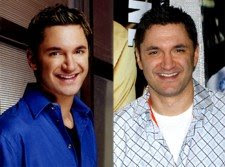 Andy died last night at Cedars-Sinai in Los Angeles after a tragic five-year battle with heart disease. I had the good fortune to meet Andy and interview him twice when I was writing my book on Angel, Hollywood Vampire in 2004 and 2005. I found him, on both occasions, to be one of the most pleasant, genuine and decent people I've ever met - in any walk of life. Andy was the epitome of the classy New England gentleman - charming, sharp, witty, the very life and soul of the party. He was, I think, wholly unaffected by finding himself thrust, somewhat unexpectedly, into the spotlight on a hit TV show in what was his first acting role. But, by the same token, he was someone who seemed genuinely thrilled by this and amazingly grateful to the show's fans for whom he always seemed to have a lot of time and who, in return, showered him with much love and affection during his public appearances. The feeling, one always felt, was entirely mutual.
Andy died last night at Cedars-Sinai in Los Angeles after a tragic five-year battle with heart disease. I had the good fortune to meet Andy and interview him twice when I was writing my book on Angel, Hollywood Vampire in 2004 and 2005. I found him, on both occasions, to be one of the most pleasant, genuine and decent people I've ever met - in any walk of life. Andy was the epitome of the classy New England gentleman - charming, sharp, witty, the very life and soul of the party. He was, I think, wholly unaffected by finding himself thrust, somewhat unexpectedly, into the spotlight on a hit TV show in what was his first acting role. But, by the same token, he was someone who seemed genuinely thrilled by this and amazingly grateful to the show's fans for whom he always seemed to have a lot of time and who, in return, showered him with much love and affection during his public appearances. The feeling, one always felt, was entirely mutual. He developed, quickly, into an accomplished actor, particularly good at dry comedy sequences and pithy, acid-tongued one-liners. But he was also a superb singer and fans of the show will fondly recall his belting renditions of songs like Stevie Wonder's 'Superstition', Tony Bennett's 'I Left My Heart in San Fransisco' and, his "theme song", LaBelle's 'Lady Marmalade' in episodes of Angel. The character he played, Krevlornswath of the Deathwok Clan (or just plain Lorne for short) was, of course, the owner and host of a demon karaoke bar, Caritas, which gave Andy plenty of opportunity to display his musical talent. One of the finest moments in Angel is in the last episode - Not Fade Away - where Lorne sings a truly heart-tugging version of 'If I Ruled the World' before going off on one, final (unwanted) mission for his friend, Angel. He based it, he said, on James Brown's rendition of the song and blew everyone on-set away with his one-take performance.
He developed, quickly, into an accomplished actor, particularly good at dry comedy sequences and pithy, acid-tongued one-liners. But he was also a superb singer and fans of the show will fondly recall his belting renditions of songs like Stevie Wonder's 'Superstition', Tony Bennett's 'I Left My Heart in San Fransisco' and, his "theme song", LaBelle's 'Lady Marmalade' in episodes of Angel. The character he played, Krevlornswath of the Deathwok Clan (or just plain Lorne for short) was, of course, the owner and host of a demon karaoke bar, Caritas, which gave Andy plenty of opportunity to display his musical talent. One of the finest moments in Angel is in the last episode - Not Fade Away - where Lorne sings a truly heart-tugging version of 'If I Ruled the World' before going off on one, final (unwanted) mission for his friend, Angel. He based it, he said, on James Brown's rendition of the song and blew everyone on-set away with his one-take performance. 'Once the makeup is on, it's fine,' Andy told Horror Online concerning the green-face-and-horns look that his character became known for. 'The contacts lenses [can be] irritating. I've never even worn regular contacts and these are much thicker. But I can't emphasise enough how extremely professional everybody is on the set, in every single department.' Always a generous man towards his fellow actors, Andy was especially fulsome in his praise of his co-star Alexis Denisof: 'He's so focused and dedicated to his craft,' Andy noted. 'I turn to Alexis for guidance on just about everything from memorising my lines to turning them into a real conversation.' Andy certainly made a deep and lasting impression on many who met him, including guest star Adam Baldwin who fondly recalled 'The person who made me laugh most was Andy Hallett. He's so gregarious and outgoing.'
'Once the makeup is on, it's fine,' Andy told Horror Online concerning the green-face-and-horns look that his character became known for. 'The contacts lenses [can be] irritating. I've never even worn regular contacts and these are much thicker. But I can't emphasise enough how extremely professional everybody is on the set, in every single department.' Always a generous man towards his fellow actors, Andy was especially fulsome in his praise of his co-star Alexis Denisof: 'He's so focused and dedicated to his craft,' Andy noted. 'I turn to Alexis for guidance on just about everything from memorising my lines to turning them into a real conversation.' Andy certainly made a deep and lasting impression on many who met him, including guest star Adam Baldwin who fondly recalled 'The person who made me laugh most was Andy Hallett. He's so gregarious and outgoing.' Andy died last night at Cedars-Sinai in Los Angeles after a tragic five-year battle with heart disease. I had the good fortune to meet Andy and interview him twice when I was writing my book on Angel, Hollywood Vampire in 2004 and 2005. I found him, on both occasions, to be one of the most pleasant, genuine and decent people I've ever met - in any walk of life. Andy was the epitome of the classy New England gentleman - charming, sharp, witty, the very life and soul of the party. He was, I think, wholly unaffected by finding himself thrust, somewhat unexpectedly, into the spotlight on a hit TV show in what was his first acting role. But, by the same token, he was someone who seemed genuinely thrilled by this and amazingly grateful to the show's fans for whom he always seemed to have a lot of time and who, in return, showered him with much love and affection during his public appearances. The feeling, one always felt, was entirely mutual.
Andy died last night at Cedars-Sinai in Los Angeles after a tragic five-year battle with heart disease. I had the good fortune to meet Andy and interview him twice when I was writing my book on Angel, Hollywood Vampire in 2004 and 2005. I found him, on both occasions, to be one of the most pleasant, genuine and decent people I've ever met - in any walk of life. Andy was the epitome of the classy New England gentleman - charming, sharp, witty, the very life and soul of the party. He was, I think, wholly unaffected by finding himself thrust, somewhat unexpectedly, into the spotlight on a hit TV show in what was his first acting role. But, by the same token, he was someone who seemed genuinely thrilled by this and amazingly grateful to the show's fans for whom he always seemed to have a lot of time and who, in return, showered him with much love and affection during his public appearances. The feeling, one always felt, was entirely mutual. He developed, quickly, into an accomplished actor, particularly good at dry comedy sequences and pithy, acid-tongued one-liners. But he was also a superb singer and fans of the show will fondly recall his belting renditions of songs like Stevie Wonder's 'Superstition', Tony Bennett's 'I Left My Heart in San Fransisco' and, his "theme song", LaBelle's 'Lady Marmalade' in episodes of Angel. The character he played, Krevlornswath of the Deathwok Clan (or just plain Lorne for short) was, of course, the owner and host of a demon karaoke bar, Caritas, which gave Andy plenty of opportunity to display his musical talent. One of the finest moments in Angel is in the last episode - Not Fade Away - where Lorne sings a truly heart-tugging version of 'If I Ruled the World' before going off on one, final (unwanted) mission for his friend, Angel. He based it, he said, on James Brown's rendition of the song and blew everyone on-set away with his one-take performance.
He developed, quickly, into an accomplished actor, particularly good at dry comedy sequences and pithy, acid-tongued one-liners. But he was also a superb singer and fans of the show will fondly recall his belting renditions of songs like Stevie Wonder's 'Superstition', Tony Bennett's 'I Left My Heart in San Fransisco' and, his "theme song", LaBelle's 'Lady Marmalade' in episodes of Angel. The character he played, Krevlornswath of the Deathwok Clan (or just plain Lorne for short) was, of course, the owner and host of a demon karaoke bar, Caritas, which gave Andy plenty of opportunity to display his musical talent. One of the finest moments in Angel is in the last episode - Not Fade Away - where Lorne sings a truly heart-tugging version of 'If I Ruled the World' before going off on one, final (unwanted) mission for his friend, Angel. He based it, he said, on James Brown's rendition of the song and blew everyone on-set away with his one-take performance. 'Once the makeup is on, it's fine,' Andy told Horror Online concerning the green-face-and-horns look that his character became known for. 'The contacts lenses [can be] irritating. I've never even worn regular contacts and these are much thicker. But I can't emphasise enough how extremely professional everybody is on the set, in every single department.' Always a generous man towards his fellow actors, Andy was especially fulsome in his praise of his co-star Alexis Denisof: 'He's so focused and dedicated to his craft,' Andy noted. 'I turn to Alexis for guidance on just about everything from memorising my lines to turning them into a real conversation.' Andy certainly made a deep and lasting impression on many who met him, including guest star Adam Baldwin who fondly recalled 'The person who made me laugh most was Andy Hallett. He's so gregarious and outgoing.'
'Once the makeup is on, it's fine,' Andy told Horror Online concerning the green-face-and-horns look that his character became known for. 'The contacts lenses [can be] irritating. I've never even worn regular contacts and these are much thicker. But I can't emphasise enough how extremely professional everybody is on the set, in every single department.' Always a generous man towards his fellow actors, Andy was especially fulsome in his praise of his co-star Alexis Denisof: 'He's so focused and dedicated to his craft,' Andy noted. 'I turn to Alexis for guidance on just about everything from memorising my lines to turning them into a real conversation.' Andy certainly made a deep and lasting impression on many who met him, including guest star Adam Baldwin who fondly recalled 'The person who made me laugh most was Andy Hallett. He's so gregarious and outgoing.'












